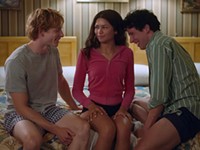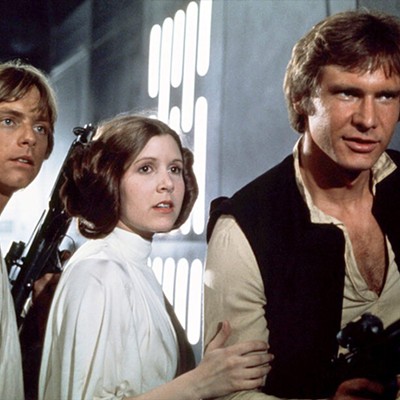[
{
"name": "500x250 Ad",
"insertPoint": "5",
"component": "15667920",
"parentWrapperClass": "",
"requiredCountToDisplay": "1"
}
]
Anyone who doubts the famous maxim attributed to Karl Marx (or perhaps his cousin Groucho) that history repeats itself, first as tragedy, then as farce, need only take a look at the new movie Guess Who. In its updating of Guess Who's Coming to Dinner of 1967, the film demonstrates that a comparable Marxist pattern operates in the cinema, changing a relatively serious depiction of an important and relevant subject into a slick and schmaltzy comedy. In the process of that transformation, the picture suggests some of the cultural and sociological shifts in American society and attitudes over the last few decades.
The original picture, in its polite and earnest way, deals with interracial marriage, certainly a more sensitive and sensational topic back in 1967, when many states denied the vote to African Americans, Jim Crow ruled public life in the South, and racial tensions generated riots in a number of major American cities. Directed by Stanley Kramer, it featured the last appearance of that famous Hollywood couple, Katherine Hepburn and Spencer Tracy, as parents whose daughter brings home her fiancé, a black physician (Sidney Poitier). Despite its air of liberal piety, the movie explored some relatively new territory for its time, and its good intentions provided at least a little balance to the rhetoric and violence of the decade.
Showing the sort of imagination that defines Hollywood at its worst, the new version simply reverses the positions of the principals, confronting the same subject from the other side of the racial chasm. This time around the family is black, and their daughter Theresa (Zoë Saldaña) brings home her white boyfriend, a New York stockbroker named Simon Green (Ashton Kutcher), for a weekend visit to New Jersey to celebrate her parents' renewal of their wedding vows on their 25th anniversary. While her mother and sister express some surprise but ultimately welcome the stranger, her father, Percy Jones (Bernie Mac), reacts with disbelief, dismay, and ultimately, absolute hostility, from which all the purported comedy flows.
That situation, the sort of high concept that fuels a thousand movies and television shows, pretty much sums up the entire content of the picture. Despite the racial component, the movie depends upon a much older notion, the introduction of a daughter's apparently inappropriate suitor to a disapproving father, which probably dates back to the origins of drama and provides the basis for laughs in countless works since then, including such recent titles as Son In Law and Meet the Parents. Once it establishes the obvious contrast and discomfort of its situation, the script then simply rings all the predictable changes on the relationship between the vapid young stockbroker and the irascible father.
The two form something of an odd couple --- another staple of comedy --- as Kutcher attempts to ingratiate himself with his prospective father-in-law, and Mac tries every imaginable ploy to alienate the suitor. He insults him incessantly, pries into his personal and professional background, attempts to dump him in a hotel, goads him into telling racist jokes, and finally insists on sharing a bed with him to prevent any improper conduct between the two young people. In a sequence that the producers apparently thought hilarious, the two engage in a completely factitious go-kart race that naturally ends in a catastrophe.
Nothing in the movie transcends the obvious and superficial situation and most of the laborious jokes and gags recall any number of television situation comedies, only without the laugh track to sweeten up the audience reaction. Even the most inexperienced viewer should experience no problems figuring out exactly how the weak and flimsy script will deal with the enmity between the suitor and the father, just what sort of reconciliation will unite all the characters in a kind of harmony, and the degree to which true love will conquer all obstacles.
With an almost admirable consistency, none of the actors rises above the material or attains any particular level of quality. Ashton Kutcher, apparently a hot young property these days, actually seems a most insipid performer, with barely enough presence to cast a shadow, and neither he nor Zoë Saldaña generate anything like chemistry, electricity, or even a mildly convincing affection.
Bernie Mac, alas, dominates the movie, which means he shouts, snorts, rolls his eyes, delivers a series of painfully obvious verbal and visual reactions, and mugs outrageously, maintaining an almost touching faith in the insultingly horrible material. Its reversal of the original material may demonstrate a maturing of the culture, but it also demonstrates how a perfectly legitimate concept can go terribly wrong; Stanley Kramer, Katherine Hepburn, and Spencer Tracy deserve more than Guess Who.
Guess Who (PG-13), starring Ashton Kutcher, Bernie Mac, Zoë Saldaña, Judith Scott, Hal Williams, Kellee Stewart, Robert Curtis Brown, RonReaco Lee, Paula Newsome; story by David Ronn and Jay Scherick; screenplay by David Ronn, Jay Scherick, and Peter Tolan; directed by Kevin Rodney Sullivan. Brockport Strand, Canandaigua Theatres, Cinemark Tinseltown, Culver Ridge, Henrietta 18, Pittsford Cinema
Latest in Movie Reviews
More by George Grella
-

Film Review: "Cake"
Jan 26, 2015 -

Film Review: "American Sniper"
Jan 19, 2015 -

Film Review: "Inherent Vice"
Jan 12, 2015 - More »






